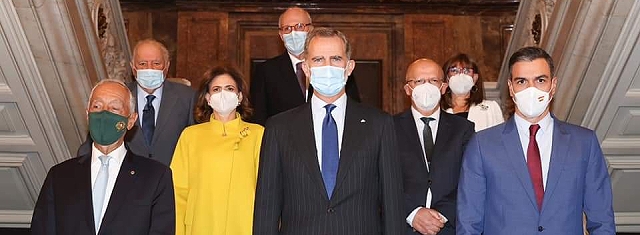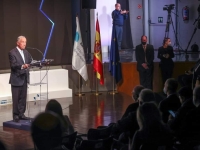Politics
30 years of dialogue and cooperation among Ibero-American countries
Felipe VI presides over commemoration

(Source: Spanish Royal House)
USPA NEWS -
The King of Spain, Felipe VI, expressed on Monday "our pride in being Ibero-American and our commitment to move forward together more and more, sharing the path towards a future that in so many ways will be common." The Monarch made this reflection during the celebration of the 30th anniversary of the Ibero-American Summits, which commemorates the first time that the leaders of 21 Ibero-American countries met to create a space for dialogue and cooperation at the highest level.
Felipe VI presided at the Casa de America, in Madrid, the celebration of the 30th anniversary of the Ibero-American Summits of Presidents and Heads of State and Government, which took place in the form of dialogue with the Presidents. Its main objective has been to value the achievements of the Summits in recent years, the countries' commitment to the Ibero-American project, the importance of Ibero-America for broad social sectors, as well as addressing future challenges. It was a blended act with guests from the fields of diplomacy, culture, economy, the media and education, among which were the President of the Spanish Government, Pedro Sanchez; the President of the Portuguese Republic, Marcelo Rebelo de Sousa; the Ibero-American Secretary General 'Ad Interim', Marcos Pinta; the vice president of the Dominican Republic, Raquel Peña; and the Minister of Foreign Relations of the Portuguese Republic, Augusto Santos Silva.
During his speech, the King stressed that the celebration of 30 years of the Ibero-American Summits is "a good opportunity to better publicize what has been done together for three decades." And also “it is to analyze the challenges that urge us and that require us to find solutions in the coming years; to listen to the demands of our societies to which we will have to respond and, above all, to reflect on the future of our Ibero-American Community in order to continue promoting its construction."
Felipe VI stressed that “we must, above all, take advantage of this celebration to express our pride in being Ibero-American and our commitment to move forward together more and more, sharing the path, towards a future that in so many ways will be common. With this, we will be complying with what we agreed on in the Guadalajara Declaration, by expressing our will to contribute together to a common future of peace, greater welfare and social equality.”
Prior to the intervention of the King of Spain, the panels "Achievements of the Summit System in the last 30 years" took place, moderated by the former Ibero-American Secretary General, Enrique V. Iglesias, and "Challenges of the Ibero-American Community of Nations," moderated by the former Ibero-American Secretary General, Rebeca Grynspan.
The Ibero-American Summits began for the first time in 1991, in Guadalajara (Mexico). It was the beginning of a process of agreement that today, thirty years later, has consolidated itself as a unique space for policy dialogue and an active platform for advanced cooperation based on unique socio-cultural links that define the Ibero-American as a community of identity and differentiated values of the societies and countries that comprise it.
Today, the Ibero-American system constitutes a dynamic reality that, like other international spaces for political, social and cultural articulation, tries to be a space for member states to collectively respond to the challenges posed by an international reality that is significantly different from those existing in the moment of its creation. For Spain, in particular, the Ibero-American dimension is a key component of its foreign and cooperation policy, and also a space of closeness and affection, where there is a network of economic, social and cultural relations with greater density and dynamism.
In the heat of the Ibero-American Summits, a multilateral space for cooperation has been promoted, characterized by the horizontality of a relationship between equal partners, which does not respond to the traditional North-South vision and goes beyond traditional instruments. A type of advanced cooperation that is based on the development of capacities, on the exchange of practices and experiences and mutual knowledge; who appreciates the mobility of talent and training; and that promotes the generation and exchange of specialized knowledge to solve the complex sustainability problems associated with the triple social, productive and environmental transition that already demanded a globalization in crisis, but that the COVID-19 pandemic has made even more urgent.
Ibero-America has an established institutional framework and consolidated instruments of multilateral, bilateral, South-South and triangular and non-governmental cooperation, that contribute to the dynamism of a system that, thirty years later, continues to be a necessity for the construction and consolidation of the Ibero-American community.
Liability for this article lies with the author, who also holds the copyright. Editorial content from USPA may be quoted on other websites as long as the quote comprises no more than 5% of the entire text, is marked as such and the source is named (via hyperlink).







